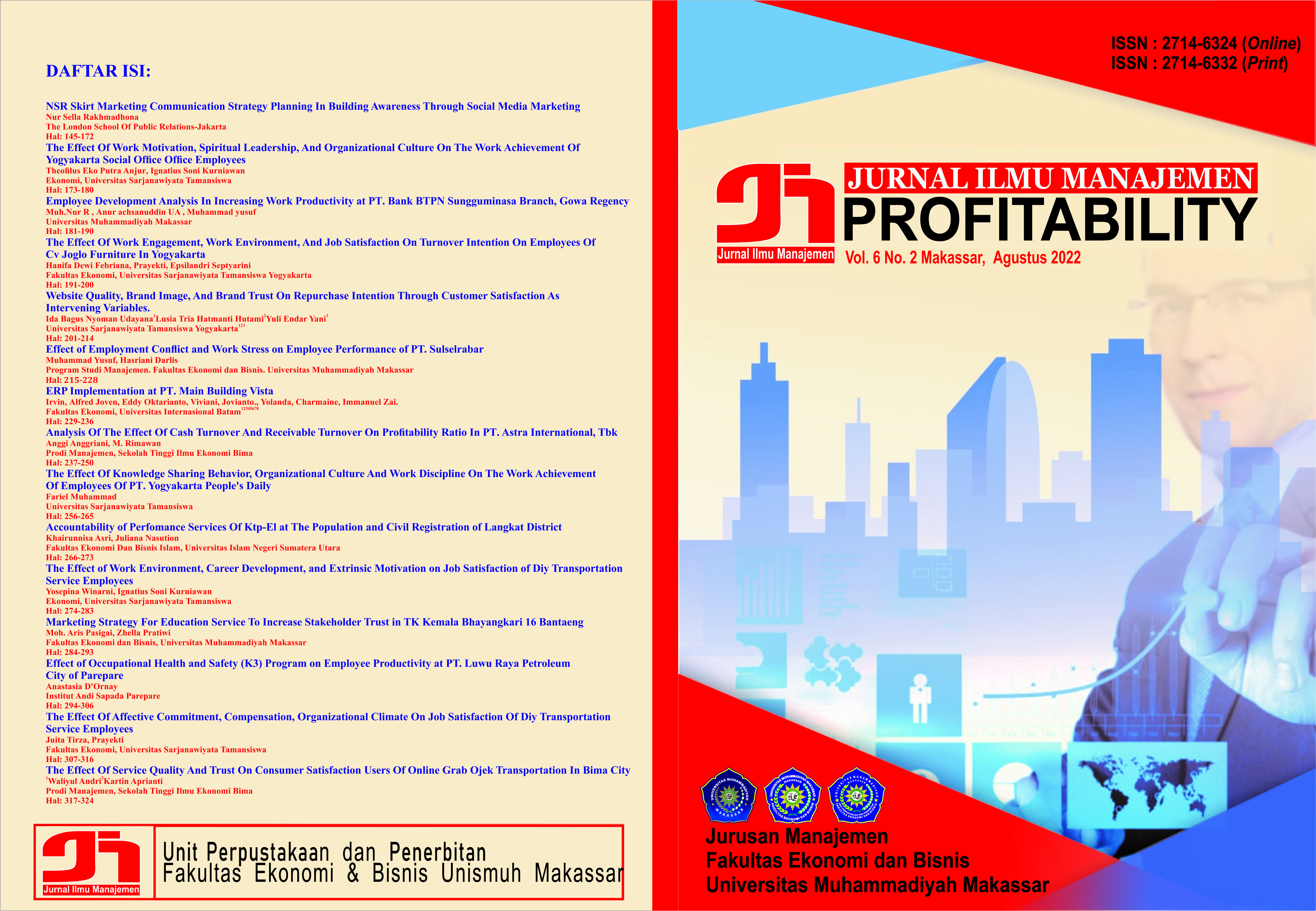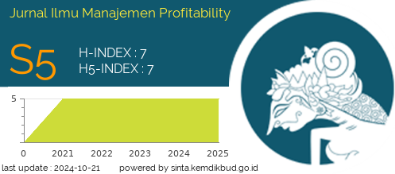The Influence of Perceived Ease of Use, Perceived Trust, and Perceived Benefits on Unismuh makassar Students' Interest in Using E-Money (OVO) on the Grab Application
DOI: https://doi.org/10.26618/profitability.v8i2.15462
Perception of Ease, Trust, Benefits and interests
Abstract
This research aims to determine the influence of perceived Ease of Use, Trust, and Benefits on the interest of Unismuh students in using the e-money (OVO) Grab application. This study employs a quantitative approach, utilizing a census method sample of 80 respondents. The data analysis was conducted using multiple linear regression analysis processed with SPSS Version 25. The research findings indicate that perceived Ease of Use significantly and positively impacts student interest. However, the influence of perceived Trust, while positive, does not significantly affect student interest. Conversely, the perceived Benefits significantly and positively impact the interest of Unismuh students in using the OVO Grab application. In summary, the study reveals that while both Ease of Use and Benefits perceptions play crucial roles in driving student interest in the OVO Grab application, Trust perception alone does not have a significant effect. These insights can guide improvements in the application’s design and functionality, enhancing user engagement and satisfaction.References
Artha, U. 2011. Pengaruh persepsI Kegunaan, persepsi Kemudahan, Persepsirisiko, Kepercayaan, inovasi Pribadi, Dan Kesesuaian Terhadap Sikap Penggunaan E-Commerce. skripsi. universitas Brawijaya.
Al-Quran(IIQ), 2012), hlm.48.
Andriyano, Y. And Rahmawati, D. (2016) ‘Pengaruh persepsi Kemudahan, persepsi Kebermanfaatan, persepsI Risiko Dan Kepercayaan Terhadap minat Menggunakan Rekening Ponsel (Studi Kasus Pada Nasabah Cimb Niaga Daerah istimewa Yogyakarta)’, Jurnal Profita, 4, Pp. 1–16.
Davis. (1989). Perceived Usefulness, Perceived Ease of Use, and User Acceptance of information Technology. Management information System Research Center. Vol. 13, No. 3:319-342.
Departemen Agama Ri , Al-Qur‟an & Terjmah Mushaf Al-Qur‟an Al-Karim, (Jakarta: Syarefa PublISIng, 2013), 597.
Departemen Agama Ri, Al-Quran dan Terjemahannya, (Jakarta: institut ilmu ovo. (2018). About Us. Diambil kembali dari http://www.ovo.id/about ovo. (2019, 10 Mei). DailySocialid. Diambil kembali dari http://dailysocial.id/post/ovo-perluas-layanan-finansial-2019.
Fadl Abdul Rahman, Al-Qur‟an dan Terjemahnya Aljumanatul A‟li, (Jakarta: JART, 2005), 397
Handayani, R. (2007). Analisis Faktor-Faktor yang Mempengaruhi MINAT Pemanfaatan Sistem informasi dan Penggunaan Sistem informasi (Studi Empiris Pada Perusahaan Manufaktur di Bursa Efek Jakarta). Jurnal AkutanS1 dan Keuangan, 9(2)., 76-87.
Jogiyanto. 2007. Sistem Teknologi Keperilakuan. Yogyakarta : Andi.
Karnadjaja, C. C., Tulipa, D., & Lukito, R. S. H. (2018). Pengaruh persepsi risiko, manfaat, dan kemudahan penggunaan terhadap minat belanja online melalui kepercayaan dan Sikap pada konsumen Zalora di Surabaya. Kajian ilmiah mahasiswa Manajemen, 6(2), 116-130.
Mayer et al. 1995. Marketing Research an Applied orientation. Prentice Hall. New Jersey.
Peraturan Bank indonesia Nomor 20/6/PBI/2018 tentang Uang Elektronik.
Triani, M. A. (2016) ‘Pengaruh persepsi Manfaat Dan persepsi Kemudahan Terhadap minat menggunakan Flazz Bca (Studi Kasus Pada mahasiswa/i ikpia Perbanas Jakarta)’, SKRIPSI, (institute Keuangan Perbankan Dan informatika Asiaa (Asian Banking Finance And informatics institute) P E R B A N A S Jakarta).
Tony Sitinjak, M. M. (2019). Pengaruh persepsi Kebermanfaatan dan persepsi Kemudahan Penggunaan Terhadap minat Penggunaan Layanan Pembayaran Digital Go-Pay. Jurnal Manajemen, 8(2).
Yusuf Qardhawi, Al-Qur‟an Berbicara Tentang Akal dan ilmu Pengetahuan, (Jakarta: Gema insani Press, 1999), 235.
Widodo, A., & Putri, A. S. A. (2017). pengaruh persepsi Kegunaan Dan persepsi Kemudahan Penggunaan Terhadap Sikap Penggunaan Teknologi Pada Pengguna instagram Di indonesia (Studi pada Followers Akun Kementerian Pariwisata@ indtravel). Jurnal Sekretaris dan Administrasi bisnis, 1(1), 18-26.
Downloads
Published
Issue
Section
License
Authors who publish with Jurnal Ilmu Manajemen Profitability agree to the following terms:
Copyright of the articles remains with the authors.
Authors grant the journal the right of first publication with the work simultaneously licensed under a Creative Commons Attribution-NonCommercial 4.0 International License (CC BY-NC 4.0). This license allows others to:
Share (copy and redistribute the material in any medium or format)
Adapt (remix, transform, and build upon the material)
as long as they give appropriate credit to the original author(s) and source, provide a link to the license, and indicate if changes were made. Non-commercial use only.
Authors are permitted to:
Distribute their published work (e.g., post it to an institutional repository or publish it in a book), with an acknowledgment of its initial publication in this journal.
Enter into separate, additional contractual arrangements for the non-exclusive distribution of the journal’s published version of the work (e.g., post it to a class website or institutional archive).
For permissions to use the content published in this journal beyond the scope of the license (e.g., commercial purposes), please contact the editorial office via the journal email.
License Details:
This journal is licensed under a Creative Commons Attribution-NonCommercial 4.0 International License (CC BY-NC 4.0).












